The 2012 MacBook Air (11 & 13-inch) Review
by Anand Lal Shimpi on July 16, 2012 12:53 PM EST- Posted in
- Apple
- Mac
- MacBook Air
- Laptops
- Notebooks
GPU Performance
All of the 2012 MacBook Air models use Intel's HD 4000 processor graphics. Similar to last year, there's no discrete GPU option. In these thermally constrained environments, Intel's HD 4000 does its best to shine compared to the 3000. And it delivers.
There's no real difference in GPU performance between the 11 and 13-inch MacBook Air, they both have an HD 4000 on-die and both perform pretty similarly. The bad news is neither is really fast enough to drive higher resolution external displays, but you can get reasonable performance in many of the hot titles on OS X today - at native panel resolution.
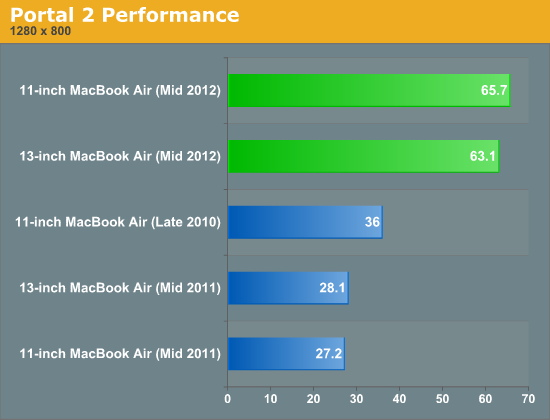
Both models deliver over 60 fps in Portal 2 at 1280 x 800. More important is the fact that the 2012 MacBook Air finally delivers better GPU performance, across the board, than the 2010 MacBook Air did with its off-processor NVIDIA GPU.
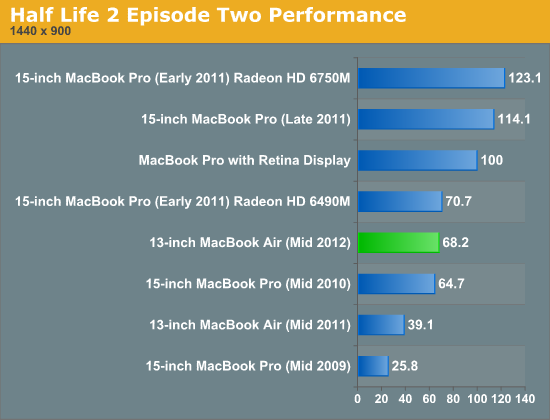
Similarly strong performance is available under Half Life 2 Episode Two.
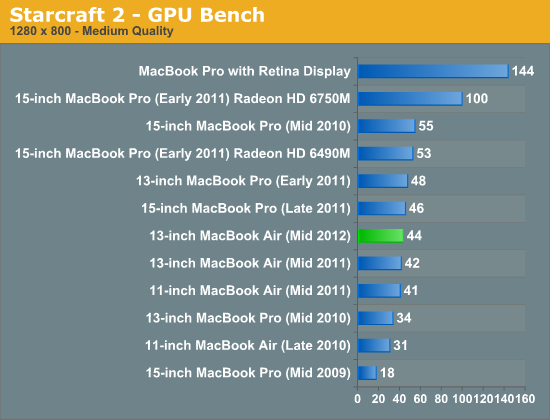
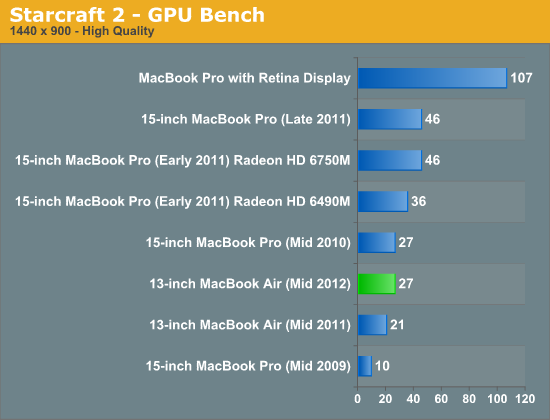
Starcraft 2 shows very little progress over the 2011 MacBook Air in the GPU tests, mostly because we're actually CPU limited here. These benchmarks only end up GPU bound at higher resolutions it seems.
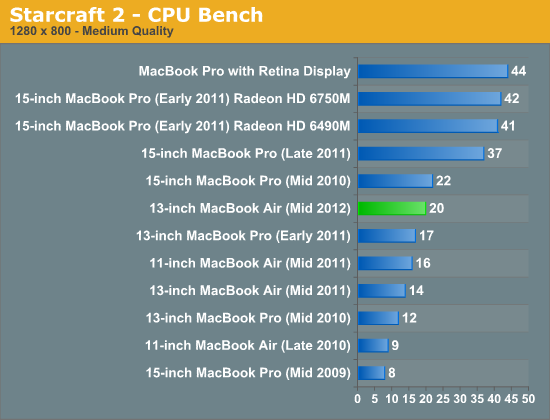
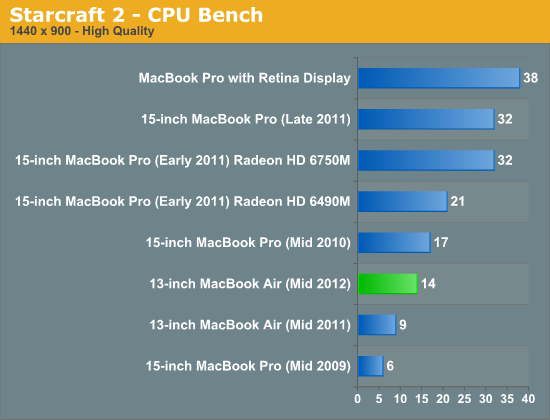
In a further bout of backwardness, our SC2 CPU tests end up being more GPU bound on the MacBook Air which yields significant performance improvements. Unfortunately neither SC2 benchmark provides particularly good results for the HD 4000.
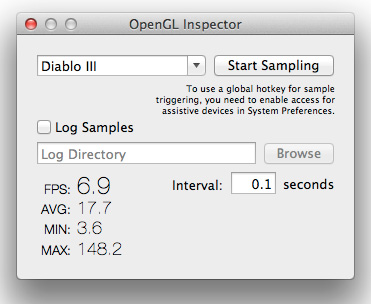
Remember that challenge for a FRAPS equivalent in OS X from the rMBP review?
I played through about an hour of Diablo III on the 13-inch MacBook Air at native resolution and at high quality settings (no AA). The game is playable on the machine, however it is far from smooth. I averaged 17.7 fps throughout my play test, with frame rates dropping as low as 7 fps with lots of baddies and explosions on the screen. It's workable in a pinch, but not ideal. If you really care about gaming on your Mac you'll need to go Pro.










190 Comments
View All Comments
KPOM - Tuesday, July 17, 2012 - link
It was a selling point during the "Switcher" campaign, but I doubt that today many people are buying Macs to run Windows. They haven't run the Switcher or "I'm a Mac" ads in years.At this point, being able to run Windows natively is a bonus, more than a key selling point.
ananduser - Tuesday, July 17, 2012 - link
Only that it is not native. There's still some virtualization overhead due to bootcamp.KPOM - Tuesday, July 17, 2012 - link
It's native. There is some emulation of BIOS commands (since Macs lack a BIOS), but it isn't running in virtualization.phillyry - Tuesday, March 26, 2013 - link
Kind of opposite views between Apple and Microsoft, with regards to driver support aren't they?MS makes it easy for the user to tinker around with or build a PC by embedding a huge number of drivers in the OS. However, this accounts for a large amount of the Windows' install.
Apple, on the other hand, go for the 'streamline just for our own hardware' approach, which seems to make sense for them because they sell hardware, as well as software. You end up with a cleaner install of the OS but at the expense of DIY. Apple also focuses on the premium build and you are really paying a lot for the hardware, when you consider that you can buy OS X for $30.
Should Apple be allowed to make it difficult to build your own Mac? Should they offer a non-upgrade retail OS X for $180? I'd say sure to the second one, as a consumer but don't see how it makes sense for Apple. They would be diverting resources away from their core product lines and diluting their premium brand. Again, should they be forced to at least make it easier for DYIers and legal for OEMs? I dunno. I'd like that but, so far, the legal system doesn't seem to be going for it.
KPOM - Tuesday, July 17, 2012 - link
Microsoft won't allow Windows RT to run on any tablets other than those that it specifies. So no Android tablet or iPad will be able to run Windows RT even if it is running identical hardware to Microsoft's Surface, for example.Should we "hang" Microsoft for not allowing their OS to run on other devices?
Freakie - Tuesday, July 17, 2012 - link
Sort of a blurry line you are crossing there. Windows RT isn't quite a full OS like OSX and regular Windows in that it needs very specific optimizations and programming techniques. Not only that, but the other "hardware" that you would be running it on isn't meant for a full OS like Windows RT mostly is. While it may technically have the same CPU and GPU, *maybe* even the same wireless radios, the chances of it having the same cameras, same screens, same circuit boards and everything is actually quite improbable =P So it wouldn't be "identical" hardware. I think that Windows RT is so optimized for its specific hardware that it will be running on, that it would be rather unhappy on other things xP That's not to say that Microsoft made the right choice in just flat-out disallowing anyone from trying to put it on other devices. It's a similar boat they are in that Apple is in. OSX is not good at running on hardware that it is not specifically optimized for, and to allow people to easily put it on other hardware would degrade OSX's image.KPOM - Tuesday, July 17, 2012 - link
They aren't marketing the Surface as an "incomplete" PC. All Metro apps will need to run on Windows RT in order to get a "designed for Windows 8" certification. Windows RT just won't run the x86 legacy applications because ARM processors don't have the capability to emulate x86 or x64 without a huge performance hit.The rest of your point is entirely in line with mine. Apple designed OS X for its own line of computers. They don't want it running on other PCs and so have designed it so that it relies upon, among other things, Apple's proprietary EFI. Microsoft had previously billed itself as selling an OS that would run on practically anything. Of course, Windows has long had a reputation (somewhat undeserved) of being crash prone and buggy, most of which can be ascribed to legacy support. Windows on one of Microsoft's reference designs runs quite well. So it's no surprise they are mandating the use of reference designs for Windows RT, even though they intend the devices to be more powerful than the current generation of iPads or Android tablets.
I think Microsoft would like to get to a point where people are indifferent about Windows RT vs. Windows 8 and ARM vs Intel.
Sufo - Wednesday, July 18, 2012 - link
Compare OSX to Windows 8 and Windows RT to iOS. Comparing a mobile to a desktop OS is misleading at best.KPOM - Friday, July 20, 2012 - link
That's certainly not how Microsoft is marketing Windows RT.Starmast3r - Thursday, August 9, 2012 - link
That is exactly how Microsoft is marketing Windows RT. It is an environment designed for mobile devices.